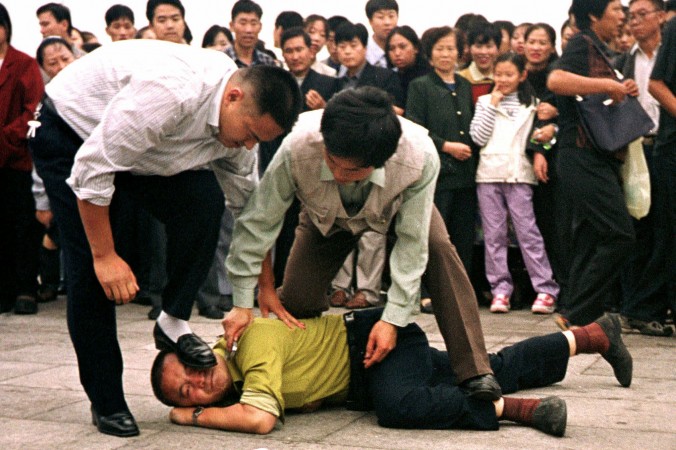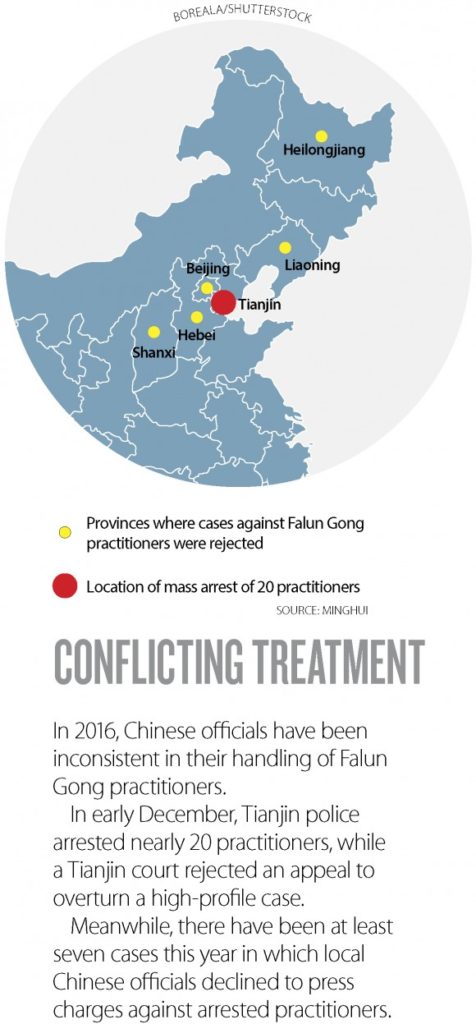
Some Places in China Waver on Persecution of Falun Gong
By Larry Ong, Epoch Times
One of China’s most ferocious political campaigns—the persecution of the Falun Gong spiritual practice, one of China’s largest spiritual communities—has gone on for 17 years now. But this year, despite the orders from the top remaining unchanged, jurisdictions around the country have been quietly resisting carrying out acts of persecution.
In one city, mass arrests have continued—with nearly 20 practitioners suddenly arrested in a busy port city in early December. Conversely, local law courts, prosecuting departments, and police stations have declined to press charges against individual practitioners, citing “insufficient evidence” for their arrest.
Observers of the persecution say that the lighter response, where it has been shown, is probably due to sympathetic local officials and a lack of continued political impetus from the top. At the same time, if there is no change of policy, such instances of leniency will remain the exceptions to the rule, as is the case this year.
‘Raising the Rifle’
Since former Chinese Communist Party leader Jiang Zemin ordered Falun Gong be eliminated in 1999, more than 4,000 practitioners have been killed by torture, while hundreds of thousands are still held in some form of detention, according to Minghui, a Falun Gong website that serves as a clearinghouse for information about the persecution. Because of the difficulty of getting information out of China, Minghui believes the actual number of deaths to be much higher.
Practitioners in detention are vulnerable to becoming victims of the regime’s practice of live organ harvesting, researchers say. The Chinese regime has performed between 60,000 and 100,000 transplants each year from 2000 to 2015, with organs sourced from prisoners of conscience—the bulk of whom are Falun Gong practitioners—according to a nearly 700-page report published in June. The harvesting of the organs kills the unwilling “donors”.
 Going by figures alone, the persecution of Falun Gong remains unchanged in 2016.
Going by figures alone, the persecution of Falun Gong remains unchanged in 2016.
Minghui has reported nearly 3,000 cases of persecution, consistent with the 2015 figure. In the first 10 months of 2016, the Chinese regime arrested and prosecuted 961 practitioners.
On Dec. 7 and Dec. 8, internal security agents and Tianjin police officers arrested nearly 20 Falun Gong practitioners, Minghui reports. In most of the incidents, police officers visited the adherents at their homes and attempted to force them to renounce their beliefs on camera. In other cases, they conducted ransackings and stuffed victims into police vehicles.
Dec. 7 also saw the Tianjin Second Intermediate Court reject an appeal to overturn a case concerning Zhou Xiangyang and Li Shanshan, a married couple whose plight over the years has garnered international attention and petitions on their behalf.
Sarah Cook, a senior research analyst for Freedom House, says the arrests are “an effort by police to pre-empt any activism on their behalf by local Falun Gong practitioners” in the high-profile case.
But this September, Chinese rights lawyers representing Zhou and Li managed to defend the core tenets of Falun Gong—truthfulness, compassion, and tolerance—in the courtroom, and were left unpunished for their defense of the practitioners.
Meanwhile, a Dec. 14 report by Minghui noted seven cases this year where the regime’s legal apparatus declined to prosecute practitioners, in the provinces of Shanxi, Hebei, Liaoning, and Jiangsu and in the cities of Beijing and Qiqihar, on grounds of insufficient evidence to even warrant an arrest. Such leniency is almost unheard of.
According to a Chinese lawyer who has defended Falun Gong adherents and spoke anonymously for safety reasons, he and others have asked security officials to follow their conscience when dealing with Falun Gong practitioners, and to “raise the rifle a centimeter upwards,” avoiding meting out severe punishment.

Mechanisms of persecution are continuing to operate.
, senior research analyst, Freedom House
The officials “didn’t raise it a whole centimeter, but they did raise it a tiny bit,” he said, adding that they never “uttered a word of protest against my suggestions.” Chinese rights lawyers have typically faced detention and torture just for defending Falun Gong.
The lawyer said that his colleagues have encountered judges who state plainly that “if we cannot sentence them, we won’t; if we cannot arrest them, we won’t.”
Judges are also handing out lighter sentences—two to three years in jail instead of upwards of seven years in jail—and some detention centers even allow practitioners to do Falun Gong exercises in their cells, the lawyer said.
Local Sympathizers
The recent contradictory scenarios in China may come down to the sympathies of local officials, rather than a clear shift in policy.
“On the one hand, there is ample evidence that the central state in China continues anti-Falun Gong activities by a number of methods,” said Stephen Noakes, a lecturer in Chinese politics at the University of Auckland, in an email.
“On the other hand, there is also evidence that many of those tasked with anti-Falun Gong activities on the ground view these efforts as futile … and/or an ineffective use of resources, given the range of social challenges a still-developing China now faces,” he added.
“Once a political campaign becomes Party policy, it’s very hard to change course”, said Heng He, a commentator with New Tang Dynasty (NTD) Television, a sister company of Epoch Times. Such campaigns will continue until orders are given from the top to stop them, he said.
“However, without Jiang Zemin himself, or his top assistants like Zhou Yongkang, driving the persecution, it leaves space for those who don’t want to take personal responsibility for it, or [those who want to] do some good out of their own conscience”, he said.
Given that the policy is still on the books, the recent resistance from inside the system is significant, he added.
“In the future, we may see more such cases.”
Luo Ya contributed to this report.
